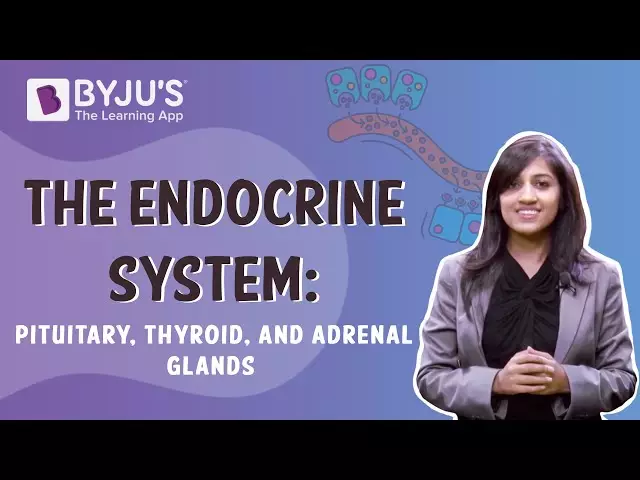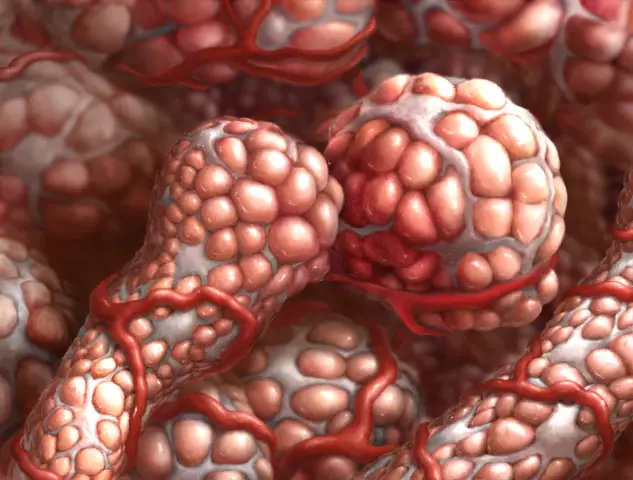- Author Rachel Wainwright wainwright@abchealthonline.com.
- Public 2023-12-15 07:39.
- Last modified 2025-11-02 20:14.
Endocrine glands
The collection of endocrine glands (endocrine glands) that produce hormones is called the endocrine system of the body.

From the Greek language, the term "hormones" (hormaine) is translated as to induce, set in motion. Hormones are biologically active substances produced by the endocrine glands and special cells found in tissues that are found in the salivary glands, stomach, heart, liver, kidneys and other organs. Hormones enter the bloodstream and affect the cells of target organs located either directly at the site of their formation (local hormones), or at some distance.
The main function of the endocrine glands is to produce hormones that are carried throughout the body. From here follow additional functions of the endocrine glands due to the production of hormones:
- Participation in metabolic processes;
- Maintaining the internal environment of the body;
- Regulation of the development and growth of the body.
The structure of the endocrine glands
The organs of the endocrine system include:
- Hypothalamus;
- Thyroid;
- Pituitary;
- Parathyroid glands;
- Ovaries and testicles;
- Islets of the pancreas.
During the period of gestation, the placenta, in addition to its other functions, is also an endocrine gland.
The hypothalamus secretes hormones that stimulate the function of the pituitary gland or, conversely, suppress it.
The pituitary gland itself is called the main endocrine gland. It produces hormones that affect other endocrine glands and coordinates their activity. Also, some hormones produced by the pituitary gland have a direct effect on biochemical processes in the body. The rate of production of hormones by the pituitary gland is arranged according to the principle of feedback. The level of other hormones in the blood gives the pituitary gland a signal that it should slow down or, conversely, accelerate the production of hormones.
However, not all endocrine glands are controlled by the pituitary gland. Some of them indirectly or directly react to the content of certain substances in the blood. For example, the cells of the pancreas, which produce insulin, respond to the concentration of fatty acids and glucose in the blood. The parathyroid glands respond to the concentration of phosphate and calcium, and the adrenal medulla responds to direct stimulation of the parasympathetic nervous system.

Hormone-like substances and hormones are produced by various organs, including those that are not part of the structure of the endocrine glands. So, some organs produce hormone-like substances that act only in the immediate vicinity of their release and do not release their secretions into the blood. These substances include some hormones produced by the brain, which affect only the nervous system or two organs. There are other hormones that affect the entire body as a whole. For example, the pituitary gland produces thyroid-stimulating hormone, which acts exclusively on the thyroid gland. In turn, the thyroid gland produces thyroid hormones that affect the functioning of the entire body.
The pancreas produces insulin, which affects the metabolism of fats, proteins, and carbohydrates in the body.
Endocrine gland diseases
As a rule, diseases of the endocrine system occur as a result of metabolic disorders. The reasons for such disorders can be very different, but mainly the metabolism is disturbed as a result of a lack of vital minerals and organisms in the body.
The proper functioning of all organs depends on the endocrine (or hormonal, as it is sometimes called) system. The hormones produced by the endocrine glands, entering the blood, act as catalysts for various chemical processes in the body, that is, the rate of most chemical reactions depends on their action. Also, with the help of hormones, the work of most organs of our body is regulated.
In case of dysfunction of the endocrine glands, the natural balance of metabolic processes is disturbed, which leads to the occurrence of various diseases. Often endocrine pathologies arise as a result of intoxication of the body, injuries or diseases of other organs and systems that disrupt the functioning of the body.
Diseases of the endocrine glands include diseases such as diabetes mellitus, erectile dysfunction, obesity, thyroid disease. Also, in case of disruption of the proper functioning of the endocrine system, cardiovascular diseases, diseases of the gastrointestinal tract, and joints may occur. Therefore, the proper functioning of the endocrine system is the first step towards health and longevity.
An important preventive measure in the fight against diseases of the endocrine glands is the prevention of poisoning (toxic and chemical substances, food, excretion products of the pathogenic intestinal flora, etc.). It is necessary to cleanse the body of free radicals, chemical compounds, heavy metals in a timely manner. And, of course, at the first signs of the disease, it is necessary to undergo a comprehensive examination, because the sooner treatment is started, the more chances of success.
Found a mistake in the text? Select it and press Ctrl + Enter.






